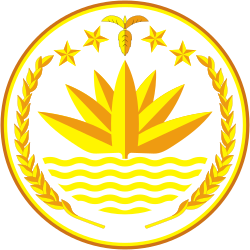30 December 2018 | |||||||||||||||||||||||||||||||||||||||||||||||||
300 of the 350 seats in the Jatiya Sangsad 151 seats needed for a majority | |||||||||||||||||||||||||||||||||||||||||||||||||
|---|---|---|---|---|---|---|---|---|---|---|---|---|---|---|---|---|---|---|---|---|---|---|---|---|---|---|---|---|---|---|---|---|---|---|---|---|---|---|---|---|---|---|---|---|---|---|---|---|---|
| Registered | 104,142,381 | ||||||||||||||||||||||||||||||||||||||||||||||||
| Turnout | 82.58% ( | ||||||||||||||||||||||||||||||||||||||||||||||||
| |||||||||||||||||||||||||||||||||||||||||||||||||
 Results by constituency | |||||||||||||||||||||||||||||||||||||||||||||||||
| |||||||||||||||||||||||||||||||||||||||||||||||||
 |
|---|
General elections were held in Bangladesh on 30 December 2018 to elect 300 directly-elected members of the Jatiya Sangsad. [1] The result was another landslide victory for the Awami League-led Grand Alliance led by Sheikh Hasina. [2] The elections were marred by violence, and were widely considered by opposition politicians and the international community to be rigged. [3] [4]
Contents
- Background
- Electoral system
- Criticism
- Schedule
- Campaign
- Parties and alliances
- Grand Alliance (AL+)
- Jatiya Oikya Front (BNP+)
- Left Democratic Alliance
- Others
- Conduct
- Violence
- Vote rigging
- Suppression of opposition
- Results
- By constituency
- Reactions
- See also
- Notes
- References
- External links
According to political scientist Ali Riaz the elections were not free and fair. [5] BBC News, among others, observed some apparent vote rigging by the Awami League, [6] with some referring to it as the 'midnight election' due to ballot boxes allegedly being filled the night before election day. [7] Opposition leader Kamal Hossain rejected the results, calling it "farcical" and demanding fresh elections to be held under a neutral government. The Bangladesh Election Commission said it would investigate reported vote-rigging allegations from "across the country." [8] [9] The election saw the use of electronic voting machines for the first time. [10]






















